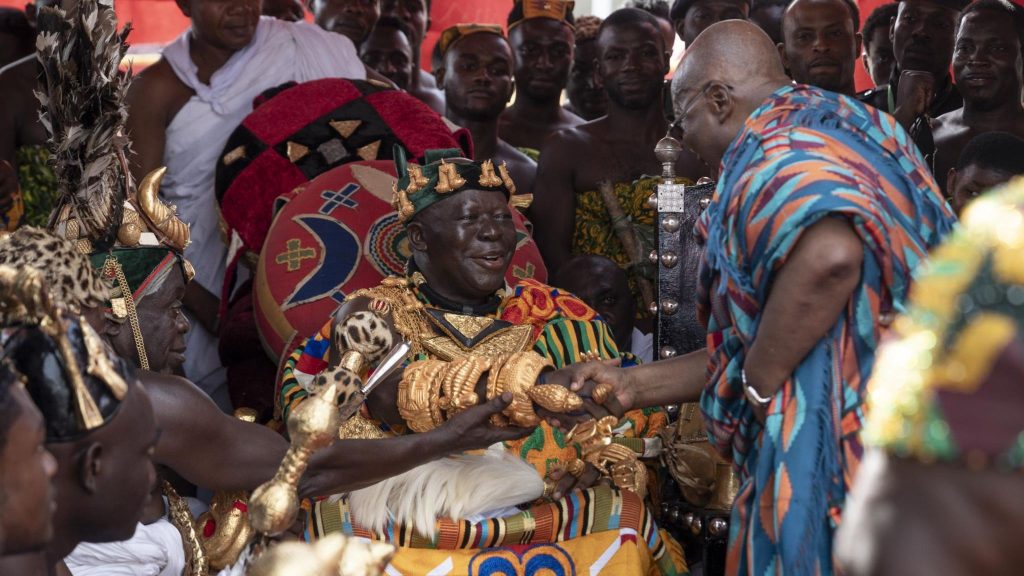Journalist’s Apology Fails to Satisfy Ashanti King
3 min read

A public dispute between a prominent journalist and the Ashanti king has captured the attention of many in Ghana, highlighting issues of respect, power, and cultural etiquette. The conflict began when journalist Afia Pokua criticized the Asantehene, Otumfuo Nana Osei Tutu II, regarding his handling of tensions with other ethnic groups and the excessive deference politicians show him. In a recent interview on Onua TV, Pokua expressed her frustrations, stating, “Even the president… bowed to show respect to the chief. Asante is not the whole of Ghana.”
Her remarks ignited a firestorm, as the Asantehene holds significant power and respect in Ghanaian society. As the traditional ruler of the Ashanti kingdom, Otumfuo Nana Osei Tutu II is revered not only for his royal lineage but also for the influential role he plays in local governance and culture. His title carries immense weight, and it is considered highly disrespectful to publicly insult or criticize him.
Royal historian Osei Bonsu Sarfo Kantanka explained to the BBC that there is a specific protocol for critiquing the Asantehene. “To criticize the leader, one must go through the queen mother,” he said. “She is the only person who can rebuke him. If you bypass this protocol, you risk serious repercussions.” Kantanka further condemned Pokua’s comments about the king’s hearing, arguing that such remarks would be offensive even if directed at an ordinary individual.
In an attempt to mend the rift, Pokua visited the Manhyia Palace in Kumasi, where the Asantehene resides. Dressed in black and accompanied by community elders, she knelt and begged for forgiveness, a gesture that was filmed for television. However, her apologies were met with hostility from representatives of the Ashanti king. They ordered her to leave the palace, with the Asantehene reportedly telling her, “Take your cursed self and your troubles with you. Whatever comes your way in the future, deal with it on your own. Do not ever return here.”
Despite her efforts to apologize both on social media and in person, the response from the royal court underscores the significance of cultural norms in Ghana. According to Kantanka, the lack of adherence to traditional protocols may have played a crucial role in the rejection of Pokua’s apology. For it to be accepted, she would have needed to engage the Agona traditional authority and bring her parents, as well as the owners of the TV station that aired her critical comments, to facilitate a more appropriate appeal.
Should Pokua choose to follow these recommended steps, it may not be too late to seek reconciliation with the Ashanti king. However, the incident serves as a stark reminder of the complex interplay between modern journalism and traditional authority in Ghana. The deep respect afforded to leaders like the Asantehene complicates the landscape for public discourse, particularly when criticism arises.
The backlash faced by Pokua raises questions about freedom of expression within the context of Ghana’s rich cultural heritage. Many Ghanaians may support her right to speak openly about powerful figures, yet the expectation of respect for traditional authority remains deeply ingrained in society. This tension reflects broader themes regarding how modern voices navigate established cultural hierarchies.
As the dust settles on this controversy, it will be interesting to observe how the relationship between the media and traditional institutions evolves. The outcome of Pokua’s attempts at reconciliation could set a precedent for future interactions between journalists and figures of authority in Ghana.
In the end, this incident illustrates the challenges faced by those who tread the fine line between critique and respect in a society where cultural protocols play a vital role. As the dialogue surrounding freedom of speech continues, both the media and traditional leaders will need to navigate these complex dynamics thoughtfully.